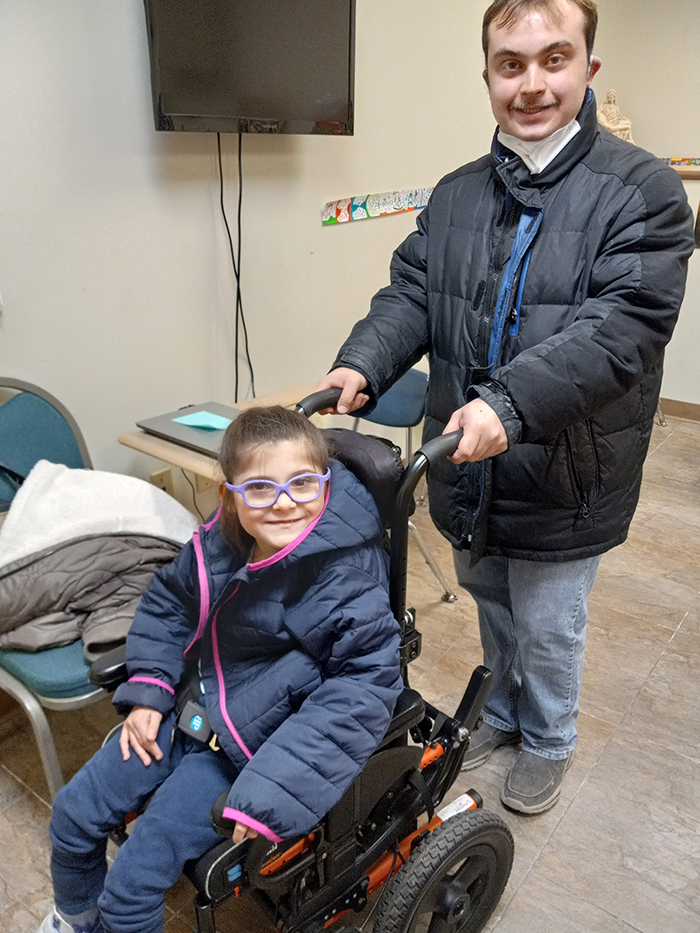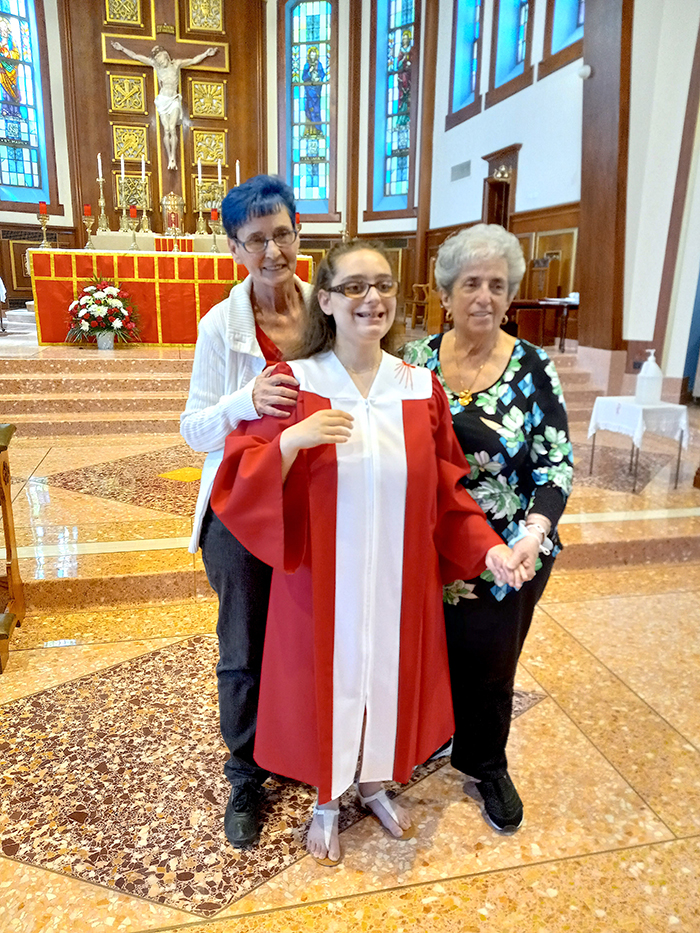
WOODSIDE — After Denise Raso’s nephew, Jared, came to live with her at when he was 2, she set out to find a religious education program that could accommodate his autism.
It was hard. Not every parish in the Diocese of Brooklyn was equipped to teach him. So Raso began teaching him on her own, relying on the Little Golden Book stories of Jesus and Easter.
Jared, now 24, received first holy Communion, but Raso had to widen the search for a confirmation program. Eventually, she found the right fit at St. Mary’s of Winfield parish in Woodside.
“They welcomed him with open arms,” Raso said. “He had a one-on-one teacher the first year, and then they put him in the typical confirmation class.”
The other confirmation students also welcomed him; one became his prom date. Now Jared is a fixture at the parish, volunteering as an usher, janitor, and an assistant catechist who helps his aunt.
Raso’s experience with her nephew paved the way to her position as a special-needs catechist at the parish. She has been at it for more than a dozen years.
“These kids — they’re so innocent,” she said. “They need me and I need them. I’ve learned so much from them. The gentle love that they have to give is amazing.”
Still, not every parish in the diocese has a catechesis program with staff trained to teach children with special needs such as cerebral palsy, intellectual disabilities, or learning disabilities, to name a few.
In November 2022, the Secretariat for Evangelization and Catechesis sent a survey to directors of religious education (DREs) in the diocese’s 185 parishes asking what sorts of special-education programs they offer.
About half of them responded, said Nelsa Elías, the secretariat’s director of Children’s Faith Formation and Catechesis. Currently, 82 parishes have some sort of a program.
Some have experienced special ed teachers volunteering as catechists, Elías said. Other parishes didn’t have any special-needs children at the time the survey was taken, but they did have “resources in place to serve them,” she added.

But Elías also noted that not every parish that ministers to children with special needs has a separate “program.” Many parishes try to integrate those students into their regular faith formation programs.
“This is ideal,” Elías said, “but not always possible and depends on the abilities of each child.”
Parishes without resources opt to recommend that the family find a parish that can accommodate them, Elías said. That’s what Raso did.
To that end, parents are urged to call the religious education offices at their respective parishes. They can also call the secretariat.
Father Joseph Gibino, vicar for evangelization and catechesis, said it is critical that parents know their children “have a place at the table.
“And that, of course, is the Eucharistic table,” Father Gibino said. “The first steps are certainly identifying the child’s need, but also working with the families so that they feel that they’re welcomed and understood.”
Catechists, Father Gibino said, must be “malleable” — able to explore the numerous ways to communicate with special-needs children.
Ashley Gleason, the DRE at Raso’s parish, shared a few.
She stressed that each child is different, so patience and attention to detail are key.
“It’s really more about getting to know that child,” Gleason said. She added that Raso is adept at seeking advice from the parents.
According to Gleason, “Denise says, ‘OK, tell me about your child. What has worked in the past? What is the way your child learns best in school?’”
From there, the team makes a plan.
For non-communicative children, Raso developed a series of visual aids on thick, laminated paper. With these images she conveys theological and spiritual concepts, from reconciliation to the resurrection.
They mimic to the children what’s going to happen at rituals, Gleason said.
While preparing a student for confirmation, for example, the team learns which bishop will be at the Mass, and they place his picture on a laminated card.
They tell the students the bishop will bless them with chrism oil, so they present unblessed oil for them to touch.
Likewise, children preparing for first Communion get to taste an unconsecrated host.
Marylyn Crum is the DRE at Immaculate Conception Parish in Astoria. She described techniques similar to those used by Gleason and Raso.
Crum also agreed that flexibility is important. For example, having all the children line up to march into Mass, and then sit together as a class, might upset some special-needs children.
So, Crum’s teachers are encouraged to let these students sit where they are comfortable.
“It’s a whole new way of looking at things,” Crum said. “It’s not the rigidity of going to Catholic school like we did years ago.”
Also looking back, Crum suggested special-needs children always existed, but decades ago, many were undiagnosed because modern methods did not exist. Hence, that community is growing.
Still, forming a special-ed catechist is as hard as it ever was, Crum said.
“Some teachers don’t want to do that,” she said. “They might get very frustrated figuring out what they’re supposed to do, or how to approach it.”
There is instructional help, Father Gibino said, but it’s not called “training” — per se.
“Don’t take this wrong,” he said, “but we train dogs and ‘form’ catechists.”
Father Gibino praised the professionally trained special-needs teachers who volunteer as catechists in the diocese.
But he had equal praise for “regular parishioners” called to the ministry of special-needs catechesis, learning techniques described by Gleason and Crum, and more.
“Every one of us is called to be a witness to Jesus,” Father Gibino said. “And that’s the skill set that we’re looking for — a living witness of the faith.”
Praise also came from Jared for the catechesis he received from his aunt and other teachers.
He eagerly gives back as an usher and a one-day-a-week janitor at the parish. He also helps Raso with multiple tasks, like collecting attendance sheets and guiding children in wheelchairs to the classroom.
“I was raised right,” he said. “All my work is important. My family is important, and God’s important. God always needs my help at St. Mary’s Church.”

Thank you for a wonderful article.